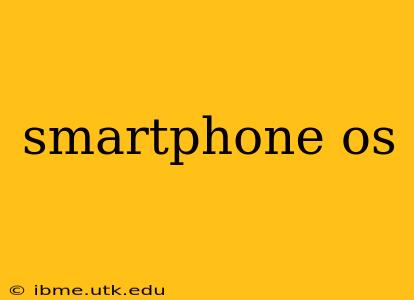The world of smartphones is dominated by a few key players when it comes to operating systems (OS). Understanding the differences between these systems is crucial for both consumers choosing a new phone and developers building apps. This comprehensive guide will explore the major smartphone OS options, their strengths, weaknesses, and the competitive landscape they inhabit.
What is a Smartphone Operating System?
A smartphone OS is the software that acts as an intermediary between the phone's hardware and its applications. It manages everything from basic functions like calling and texting to more complex tasks like running apps, accessing the internet, and managing files. Think of it as the brain of your phone, dictating how everything works. Without an OS, your smartphone would be just a collection of inert components.
The Major Players: iOS vs. Android and Beyond
The mobile OS market is primarily a two-horse race: Apple's iOS and Google's Android. However, other contenders exist, albeit with significantly smaller market share.
iOS (Apple): Known for its user-friendly interface, seamless integration with Apple's ecosystem (iMacs, iPads, Apple Watches, etc.), and robust security features, iOS commands a loyal following. Its app store, while smaller than Google Play, is generally considered to have a higher quality of apps due to stricter curation. The closed nature of iOS, however, limits customization options.
Android (Google): Android is the world's most popular mobile OS, boasting a vast library of apps on its Google Play Store and incredible flexibility. Its open-source nature allows for significant customization, and Android phones are available at a wide range of price points, making it accessible to a broader audience. However, fragmentation (different versions of Android running on different devices) can sometimes lead to compatibility issues and security vulnerabilities.
Other Smartphone OS: While iOS and Android dominate, other operating systems exist, such as HarmonyOS (Huawei), KaiOS (feature phones), and BlackBerry OS (legacy). These platforms cater to niche markets or specific device types and generally have significantly smaller user bases compared to iOS and Android.
What are the Key Differences Between iOS and Android?
This is arguably the most frequently asked question regarding smartphone operating systems. Here’s a breakdown of their core distinctions:
User Interface and Experience:
- iOS: Known for its intuitive and minimalist design, iOS prioritizes simplicity and ease of use. Its consistent interface across all devices makes it incredibly user-friendly.
- Android: Offers greater customization options, allowing users to personalize their home screens, widgets, and launchers. This flexibility comes with a slightly steeper learning curve for new users.
App Stores and App Availability:
- iOS: The App Store has a reputation for higher quality control and fewer malicious apps. However, it may lack the sheer volume of apps found on Google Play.
- Android: Google Play Store boasts a significantly larger library of apps, catering to a broader range of devices and user needs. However, the app vetting process is less stringent, potentially exposing users to more malware.
Security and Privacy:
- iOS: Apple's tightly controlled ecosystem generally provides a more secure experience, with stricter app approval processes and regular security updates.
- Android: While Android’s security has improved significantly in recent years, the open-source nature and device fragmentation make it potentially more vulnerable to security threats. However, Google provides regular security updates for its own devices and actively works to mitigate vulnerabilities.
Cost and Device Variety:
- iOS: Typically associated with higher-priced devices, the iOS ecosystem offers a more premium experience.
- Android: Offers a wider range of price points, from budget-friendly devices to high-end flagships.
What are the Pros and Cons of Each OS?
Let's break down the advantages and disadvantages of each operating system in a more concise manner:
iOS Pros:
- User-friendly interface
- Strong security and privacy
- Seamless integration with other Apple devices
- High-quality apps
iOS Cons:
- Limited customization
- Higher device costs
- Smaller app selection compared to Android
Android Pros:
- Wide range of devices and price points
- Extensive app selection
- High degree of customization
- Open-source nature
Android Cons:
- Can be more prone to security threats (depending on the device and Android version)
- Fragmentation can lead to compatibility issues
- User interface can be less consistent across devices
Which Smartphone OS is Right for Me?
The "best" OS ultimately depends on individual needs and preferences. If you value simplicity, seamless integration within an ecosystem, and a premium user experience, iOS is a strong choice. If you prioritize affordability, customization, and a vast app library, Android might be a better fit. Consider your priorities and explore the options available before making a decision.
What are the Future Trends in Smartphone OS?
The future of smartphone OS likely involves:
- Increased focus on AI integration: Expect more sophisticated AI features to enhance user experience and improve device functionality.
- Enhanced security measures: Security will continue to be a paramount concern, with OS developers focusing on more robust security protocols.
- Cross-platform compatibility: Efforts towards greater interoperability between iOS and Android could emerge to streamline user experiences.
- Foldable and flexible screen optimization: OS development will continue to adapt to emerging device form factors.
This in-depth analysis provides a comprehensive overview of the smartphone OS landscape, equipping readers with the knowledge to make informed decisions and stay abreast of the evolving technological landscape. The choice between iOS and Android, or any other OS, ultimately depends on individual needs and priorities, but this information should help clarify the major considerations.
